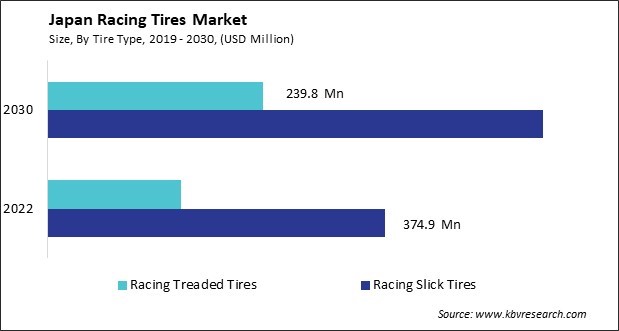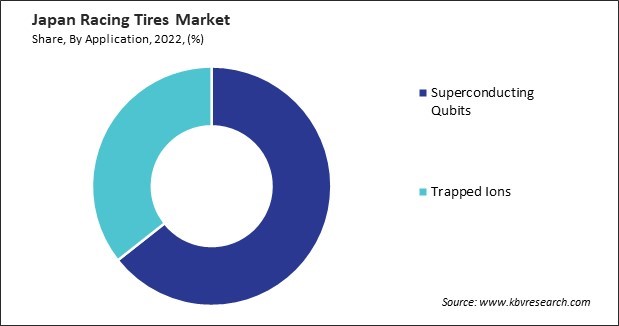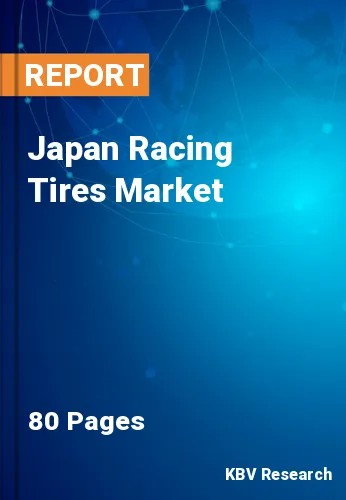The Japan Racing Tires Market size is expected to reach $789.8 billion by 2030, rising at a market growth of 5.4% CAGR during the forecast period.
The racing tires market in Japan is a dynamic and competitive industry that plays a crucial role in the country's motorsports scene. The demand for high-performance racing tires in the racing tires market is driven by various factors, including the popularity of motorsports events, technological advancements, and the pursuit of excellence in racing performance.

Motorsports have a long history in Japan, dating back to the early 20th century when the country witnessed the emergence of racing circuits and events. Over the years, motorsports have evolved significantly, attracting a diverse audience and fostering a passionate community of racers, teams, and spectators. Today, Japan hosts a wide range of motorsports events, including circuit racing, drifting, rally, and time attack competitions, each requiring specialized tires tailored to the specific demands of the sport.
One of the key drivers of the racing tires market in Japan is the country's prominent role in the global automotive industry. According to the International Trade Administration, the automotive industry is Japan's leading industry; in 2019, approximately 17 trillion JPY or about 21% of Japan's total exports of automotive-related products were sold. Japanese automakers have a reputation for producing high-performance vehicles renowned for their engineering excellence and technological innovation. As a result, there is a constant demand for racing tires that complement the performance capabilities of these vehicles, whether on the track or in competitive events.
However, the racing tires market in Japan has yet to be immune to the effects of the COVID-19 pandemic. The pandemic disrupted global supply chains, leading to raw materials and components shortages essential for tire manufacturing. Additionally, restrictions on travel and social gatherings resulted in canceling or postponing numerous motorsport events, reducing the demand for racing tires. Moreover, economic uncertainty and consumer cautiousness during the pandemic have dampened spending on non-essential goods, including high-performance racing tires. As a result, Japanese racing tire manufacturers have faced challenges in maintaining production levels and adapting to shifting industry dynamics amidst the ongoing pandemic.
The racing tires market in Japan has been experiencing a notable shift in recent years. One of the key drivers behind the increasing influence of motorsport culture is the rise in popularity of motorsport events and competitions across Japan. From grassroots drifting competitions to major international racing events like Super GT and Formula Drift Japan, motorsport has captured the imagination of a diverse audience, ranging from dedicated racing enthusiasts to casual fans. As a result, there has been a surge in demand for high-performance racing tires that meet the rigorous demands of competitive driving.
Additionally, the success of Japanese racing teams and drivers on the global stage has further fueled interest in motorsport within the country. With iconic figures like Keiichi Tsuchiya and Nobuteru Taniguchi achieving international acclaim, Japanese motorsport has garnered widespread recognition for its technical prowess and competitive spirit. This has bolstered the prestige associated with motorsport culture and incentivized enthusiasts and professionals to invest in high-quality racing tires to enhance their performance on the track.
Moreover, the convergence of technology and motorsport has led to significant advancements in tire design and manufacturing techniques. Japanese tire manufacturers have been at the forefront of innovation, leveraging insights gained from motorsport to develop cutting-edge racing tire technologies. Thus, the rising popularity of motorsport culture in Japan, fueled by increasing events and international success, has driven a notable surge in demand for high-performance racing tires, spurring innovation and tire technology advancements by Japanese manufacturers.
Japan's racing tires market has witnessed significant advancements in vehicle technology in recent years. One key area of advancement in racing tires technology in Japan lies in the development of high-performance compounds and materials. Tire manufacturers in Japan are constantly researching and experimenting with new rubber compounds reinforced with advanced materials such as carbon fiber, silica, and aramid fibers. These materials offer improved grip, durability, and heat resistance, allowing racing teams to push their vehicles to the limit while maintaining optimal performance throughout a race.
Moreover, advancements in tire construction techniques have also played a crucial role in enhancing performance on the racetrack. Japanese tire manufacturers have invested heavily in cutting-edge manufacturing processes such as computer-aided design (CAD) and finite element analysis (FEA) to optimize tire profiles, tread patterns, and sidewall stiffness. Furthermore, integrating sensor technology into racing tires has revolutionized how teams monitor and optimize tire performance during races. Tire pressure monitoring systems (TPMS) and tire temperature sensors provide real-time data on tire conditions, allowing teams to adjust tire pressures and suspension settings for optimal performance and tire longevity.
Moreover, Japan's automotive industry is renowned for its emphasis on research and development, with tire manufacturers investing heavily in state-of-the-art facilities and top-tier talent to stay ahead of the curve. Furthermore, advancements in materials science have played a pivotal role in shaping the evolution of racing tires in Japan. Hence, Japan's racing tires market continues to lead with cutting-edge technology, leveraging advanced materials, manufacturing techniques, and sensor integration for optimal performance on the racetrack.

The racing tires market in Japan is a dynamic and competitive industry characterized by innovation, technology, and a passion for motorsports. One of the key players in the Japanese racing tires market is Bridgestone Corporation. Founded in 1931, Bridgestone has established itself as a global leader in tire manufacturing, offering a wide range of products for various applications, including racing. The company's dedication to research and development has led to the creation of high-performance racing tires trusted by drivers and teams across different motorsport disciplines. Bridgestone's involvement in racing extends beyond supplying tires; it also actively participates in motorsport events, leveraging these opportunities to test and refine its products.
Another prominent player in the Japanese racing tires market is Yokohama Rubber Company. With a history dating back to 1917, Yokohama Rubber has built a reputation for producing innovative, durable tires for road and track use. The company's racing tires are designed to deliver exceptional performance, handling, and durability under the most demanding conditions. Yokohama Rubber's commitment to motorsports is evident through its partnerships with racing teams and events, where its tires are showcased and put to the test on the track.
Toyo Tire Corporation is also a significant player in the Japanese racing tires market. Founded in 1945, Toyo Tire has grown into a leading manufacturer of tires for various applications, including motorsports. The company's racing tires are known for their advanced technology, performance-oriented design, and consistent performance across different racing disciplines. Toyo Tire's involvement in motorsports spans from grassroots racing events to high-profile championships, where its tires have earned a reputation for excellence among drivers and teams.
Furthermore, Sumitomo Rubber Industries, Ltd. (SRI) is a notable contender in the Japanese racing tires market. Established in 1909, SRI has evolved into a diversified company with a strong focus on tire manufacturing. Its racing tires are developed using cutting-edge technology and tested under extreme conditions to ensure optimum performance and reliability on the track. SRI's commitment to motorsports is reflected in its sponsorship of racing teams and events, where its tires demonstrate their capabilities in various racing disciplines. These companies often specialize in producing tires for particular types of racing, such as circuit racing, rally, or drifting, and provide customized solutions tailored to the unique requirements of their customers.
By Tire Type
By Application
By Distribution Channel
Our team of dedicated experts can provide you with attractive expansion opportunities for your business.

